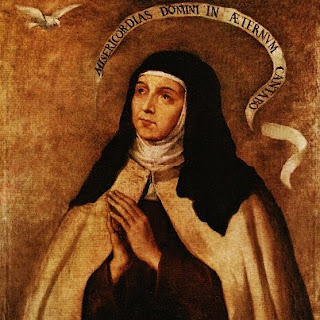Today, Wednesday, October 24, 2012, in the Traditional Calendar it's the Feast of St. Raphael the Archangel.
What follows is a comment made by the late Prof. Plinio Corrêa de Oliveira.
Regarding devotion to the Angels, something rarely spoken about today is that Heaven is a true court. When I was a boy and the egalitarian spirit was less pervasive in society, more was said about the Heavenly Court. Books of piety, religion teachers and people in general spoke much more about the Heavenly Court.
The idea of a heavenly court is based on the idea that God stands before the Angels and Saints as a King before his court. Because of the similarity that exists between Heaven and creation, the earthly courts in many ways are images of the Heavenly Court. For example, following the monarchic protocol that existed to make the work of the King easier, there were eminent nobles who assisted the King when he received placets, that is, the requests of his people.
First, each person would approach the King, be presented by a noble, and speak briefly with the King putting forth his request. Then, he would deliver a scroll with his formal request to the King, which would be passed to a high dignitary and placed on a table. In this way the King would hear many different persons in an audience. Their requests would be examined by a special council, which would give its opinion and ask the King for his final decision.
You can see that requests to the King, as well as his decisions, were mediated by many nobles. One would reach the King through the same steps that served to distribute his decisions. In the court there is a hierarchy of functions, dignities and mediations that allow an individual to approach the King, as well as for the King to reach the individual. This is the mechanism of the court.
In the Heavenly Court, much the same thing happens. In absolute terms, God Our Lord does not need anyone. However, since He created a multitude of diverse beings, it is natural that He would give these creatures tasks according to their positions, dignities and missions. It is also natural that these beings would exert a special efficiency, brilliance and splendor to serve their Creator.
Heaven needs, therefore, a life with hierarchy, diversification of function, protocol, and dignity of court. One of the consequences of this is that, according to the order created by God, the Angels should be the intercessors and rulers of men.
The feast day of St. Raphael reminds us that he is an eminent intercessor – a special patron of the sick and travelers – who brings our prayers to God. He is one of the highest angelic spirits that assist God and, therefore, has conditions to ask God for the graces we need.
This general consideration inspired by St. Raphael’s mission shows us how similar earthly realities are to heavenly realities. Insofar as we love the earthly realities that are similar to those of Heaven, we are preparing ourselves for Heaven. Love of hierarchy, nobility, distinction and elevation prepare us for Heaven.
This preparation for Heaven is ever more necessary as we sink into a world of horror. Our exterior surroundings are increasingly monstrous, chaotic and disorganized. In order not to fall into despair, the human soul needs to see something that is magnificent and well-organized. It is harmful to a man’s soul to live in constant disarray, seeing things deteriorating and decaying. Since everything that is elevated and dignified is disappearing from the earth, our desire for Heaven should intensify in order not to lose the psychological conditions to survive in this world.
Just to have an idea of the splendor of St. Raphael, we can consider that a saint, whom I think was Blessed Anna Maria Taigi but I am not sure, saw her Guardian Angel. When she saw him, she prostrated herself on the ground to adore him, thinking that he was God. The Angel then explained that he was just her Guardian Angel. From this we can have an idea of how the splendor of a simple Guardian Angel – who belongs to the lowest choir of Angels – is absolutely superior to our human nature. Further, if this is the case regarding a simple Guardian Angel, we see that it is almost unimaginable for the human mind to grasp the full splendor of St. Raphael.
Is there a way for us to visualize the relation of St. Raphael with Our Lady? We know that it is difficult, but returning to the earthly realities that are images of Heaven, we can picture how St. Louis of France, for example, would have dealt with his mother, Blanche of Castile. He was a tall man, handsome, magnificent, who both attracted and imposed respect. He was affable to his friends and terrible before his enemies. He was the most grandiose and decorous king of his time. He was also a saint, and the aura of sanctity reflected in him. This grand man was a devoted son as well. If we imagine him speaking with Blanche of Castile, we picture in the scene a great distinction, elevation and sublimity.
This image provides us an analogy to understand the relation of St. Raphael with Our Lady. St. Louis was a kind of angel in earth; St. Raphael is a kind of St. Louis in Heaven. The transposition gives us an idea of the joy that we will have in Heaven contemplating St. Raphael.
Let us ask him to help us to reach Heaven in order to contemplate him. We should also ask him to help us maintain a constant consideration of the celestial order to give us consolation and the hope of Heaven and the Reign of Mary in the increasingly sad days in which we live.







